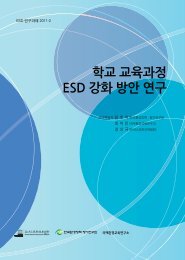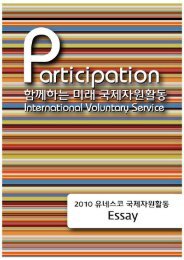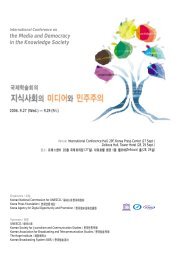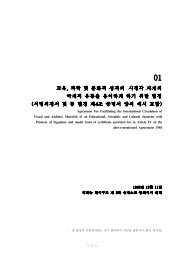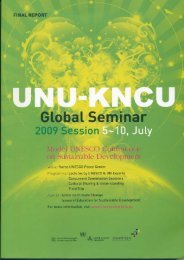íëìë³´ë2012문íì ë°ì ë¼ì´ëí ì´ë¸.pdf - ì ë¤ì¤ì½íêµììí
íëìë³´ë2012문íì ë°ì ë¼ì´ëí ì´ë¸.pdf - ì ë¤ì¤ì½íêµììí
íëìë³´ë2012문íì ë°ì ë¼ì´ëí ì´ë¸.pdf - ì ë¤ì¤ì½íêµììí
You also want an ePaper? Increase the reach of your titles
YUMPU automatically turns print PDFs into web optimized ePapers that Google loves.
Presentation<br />
Culture and Development: Focusing on Overcoming Poverty and the Role of Culture<br />
Ryu, Seung-ho<br />
Department of Visual Culture, Kangwon University<br />
I. Development from a Cultural Perspective: Consideration of Cultural Diversity<br />
“Cultural approach to poverty” is often an unwelcome subject for social scientists who deal<br />
with poverty issues. They argue that culture is the reason why poor people cannot escape<br />
from poverty no matter how much welfare they receive. This rationale leads to the<br />
justification of poverty. This logic applies to the rich as well. The rich are worthy of their<br />
wealth because they hold certain values, and the disparity in values is what results in the<br />
difference in capabilities, which eventually makes them rich. A cultural approach that ignores<br />
the structural factors that affect poverty and wealth, and instead blames individual or group<br />
values denote that the income gap is a matter of values as well. Under this logic, poverty and<br />
wealth are cultural values that cannot easily be changed and hence passed on from generation<br />
to generation. For this reason, social science research on poverty from a cultural perspective<br />
has remained unpopular for the past several decades.<br />
Ironically, this approach to understanding poverty has recently gained the attention of the<br />
mainstream sociology academia. “Reconsidering poverty and culture” by Small et al (2010)<br />
is a reflection of this trend. As questions were raised about the long-term effects of the<br />
economic, educational, and political institutions established by the West to reduce poverty,<br />
such as affirmative action and employment policies, people began to argue yet again that<br />
poverty is more closely related to culture than it is to politics or economics. Moreover, with<br />
the progress of science, it has become possible to analyze the workings of the human mind,<br />
which is at the core of culture.<br />
Thus, the understanding of the previously vague and arbitrary concept of culture is<br />
becoming increasingly concrete and applicable to the real world. Such a change is another<br />
drive behind the re-interpretation of culture. With the progress in cognitive science raising the<br />
possibility of understanding and re-shaping people's way of thinking and their values, fresh<br />
approaches to cultural values have started to emerge.<br />
An economic viewpoint cannot answer some of the more important questions regarding<br />
poverty. Why do people fall into poverty in the first place? Studies have shown that recipients<br />
of economic aid tend to be complacent instead of trying to escape from poverty. Why is this



